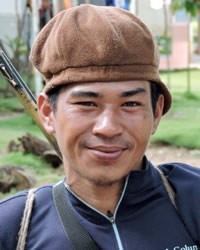Pekal in Indonesia

Photo Source:
Copyrighted © 2026
International Mission Board-SBC - Jacob Talley All rights reserved. Used with permission |
Send Joshua Project a map of this people group.
|
| People Name: | Pekal |
| Country: | Indonesia |
| 10/40 Window: | Yes |
| Population: | 42,000 |
| World Population: | 42,000 |
| Primary Language: | Pekal |
| Primary Religion: | Islam |
| Christian Adherents: | 0.02 % |
| Evangelicals: | 0.02 % |
| Scripture: | Translation Started |
| Ministry Resources: | No |
| Jesus Film: | No |
| Audio Recordings: | No |
| People Cluster: | Minangkabau-Rejang of Sumatra |
| Affinity Bloc: | Malay Peoples |
| Progress Level: |
|
Introduction / History
The Pekal live along the southwest shores of Sumatra. They live in the North Bengkulu Regency. To the west their area is bordered by the Indian Ocean, while to the east are the Bukit Barisan Mountains. The Pekal are often called the Ketahun because many live in Ketahun District. The main highway in western Sumatra that connects Lampung Province to the city of Padang passes through the Pekal area. The Pekal language is part of the Malay language cluster and is used for everyday interaction. The Minangkabau language has influenced the current Pekal language spoken by people today.
What Are Their Lives Like?
The majority of the Pekal work as farmers and plantation workers during the rainy season and as fishermen in the dry season. They use traditional, home-made devices and tools in their work. They grow coffee, rice, chocolate, tobacco, tapioca, spices, peanuts and various vegetables. The Pekal also work as teachers, government workers, military personnel, construction workers, basket weavers, brick makers and merchants. The women work in the rice fields and process dried fish and shrimp. The traditional market is a cultural event involving many people. Merchants from other areas come once a week to the bazaar. The Pekal live in homes on stilts; these homes are long and narrow. The Pekal are composed of different clans spread out in districts. If a newcomer wants to live with the Pekal, this person has to cook a meal to share with his/her chosen clan as well as other nearby clans. After this, the person will be formally considered a part of the clan and will be treated like all other Pekal, without distinction for ethnicity, religion, education, or economic status. In the Pekal culture, all people have the same rights. The newcomer must fulfill customary and traditional obligations and fulfill the duties of a Pekal community member.
What Are Their Beliefs?
Almost all Pekal profess Islam but still believe in spirits. This can be seen when they use mantras to call down rain, drive out evil spirits and purify their village from immoral acts. The Pekal have a tradition of giving mutual aid, both socially and materially. They feel obligated to help others because each person relies on others. Although their own income is low, they willingly give help to those in need, like victims of natural disasters. They also contribute to help build mosques.
What Are Their Needs?
Creativity is needed to create new jobs, as many young people do not have employment. The area is still underdeveloped economically compared to other areas of Sumatra. The Pekal need professionals to help them in economic development, education, health and farming. Effective technology could also be introduced to raise their productivity.
Prayer Points
Pray for the Lord to thrust out loving workers who will dedicate themselves to making disciples who will make more disciples.
Pray for the Holy Spirit to give Pekal leaders dreams and visions of the risen Christ, opening their hearts to change.
Pray for hearts and minds that are open to the Bible and to Jesus Christ as the only way to the Father.